Avoir Conjugation in All 8 French Tenses
Avoir in French is one of the most frequently used verbs. The meaning of avoir is “to have”.
This article gives you avoir conjugations in the most common indicative tenses of the French language, as well as some hints on how you would use them in everyday speech. This article will also help you to learn correct grammar so your speech and communication skills in French become top notch!
Why only the 8 indicative tenses? Because those are the tenses you’ll hear when practicing your French! There are 13 other tenses but they have more to do with mood and some intent. On top of that they’re rarely used, so even if you’re an intermediate or advanced French learner then the indicative 8 are ALL you need!
Before you continue: Corrector provides a free tool to help you correct grammar and spelling in any language (including conjugations)! Just click here to access it!
French Tenses for Avoir Conjugation
- Présent. Something that is happening now. This can either be ongoing or instant. Eg: I have. / I’m having.
- Imparfait (imperfect). Used to describe ongoing, continual or habitual past events. Eg: I was having.
- Passé simple is not common and normally found in formal or literary contexts. If you’re a beginner or even intermediate French learner then you can safely ignore it for now (but it’s still included below for convenience). Eg: I had.
- Passé composé. Widely used to talk about completed past actions. Eg: I had.
- Futur simple (simple future) is used when you intend to describe a general future state of being. Eg: I will have. Once again, beginners can generally ignore this conjugation as there’s a much simpler version (next in list) that will suffice for now.
- Futur proche (near future) describes an upcoming action. In English this would be “I am going to have …“. This should be your go to future tense when learning conjugations.
- Plus-que-parfait (pluperfect). This tense indicates that an action had taken place and was completed before another past action took place. Eg: I had it before eating my meal.
- Passé antérieur is not common at all (just like passé simple), and again is found in formal or literary contexts. Eg: I had.
- Futur antérieur (future perfect) is used to describe a future action that will be completed in the future before another action is started. For example: I will have had coffee before eating breakfast.
Mastering avoir conjugation in at least 3 tenses (present, passé composé and futur proche is essential for becoming proficient in French. In fact I would concentrate on these 3 and only study the others when they come up in literature or other contexts.
Avoir Présent Tense Conjugation (Present Tense)
| Pronoun | Conjugation | English Translation |
|---|---|---|
| J’ | ai | I have |
| Tu | as | You have (singular) |
| Il/Elle | a | He/She has |
| Nous | avons | We have |
| Vous | avez | You have (plural) |
| Ils/Elles | ont | They have |
Usage: Present tense is used to express actions or states that are happening right now or are generally true. It is the most frequently used tense in many languages.
Examples:
- Je n’ai pas le temps maintenant. (I don’t have time right now.)
- Nous avons un rendez-vous ce soir. (We have an appointment tonight.)
- Ils ont une belle maison. (They have a beautiful house.)
Avoir Imparfait Conjugation (Imperfect – Past Tense)
| Pronoun | Conjugation | English Translation |
|---|---|---|
| J’ | avais | I had |
| Tu | avais | You had (singular) |
| Il/Elle | avait | He/She had |
| Nous | avions | We had |
| Vous | aviez | You had (plural) |
| Ils/Elles | avaient | They had |
Usage: The imperfect tense is used to describe ongoing or habitual past actions. In everyday language, it is used to recount past events or situations. For avoir conjugation
Examples:
- Quand j’étais jeune, j’avais un chien. (When I was young, I had a dog.)
- Nous avions l’habitude d’aller à la plage tous les étés. (We used to go [literal: had the habit] to the beach every summer.)
- Ils avaient peur du noir quand ils étaient enfants. (They were afraid of the dark when they were kids.)
Avoir Passé Simple Conjugation (Simple Past Tense)
| Pronoun | Conjugation | English Translation |
|---|---|---|
| J’ | eus | I had |
| Tu | eus | You had (singular) |
| Il/Elle | eut | He/She had |
| Nous | eûmes | We had |
| Vous | eûtes | You had (plural) |
| Ils/Elles | eurent | They had |
Usage: The passé simple is mainly used in literary contexts, such as formal writing, literature, or history writing. In everyday language, it has been largely replaced by the passé composé.
Examples:
- Il eut une soudaine envie de partir. (He suddenly felt like leaving.)
- Nous eûmes une discussion animée sur le sujet. (We had a lively discussion on the topic.)
- Les voyageurs eurent du mal à trouver un logement. (The travelers had difficulty finding accommodation.)
Avoir Passé Composé Conjugation (Simple Past Tense)
| Pronoun | Conjugation | English Translation |
|---|---|---|
| J’ai | eu | I have had |
| Tu as | eu | You have had |
| Il/Elle a | eu | He/She has had |
| Nous avons | eu | We have had |
| Vous avez | eu | You have had |
| Ils/Elles ont | eu | They have had |
Usage: The passé composé is used to talk about completed actions or events in the past. It is one of the most common past tenses used in everyday conversation and writing. Note that the English translations below sometimes shorten the “have had” elements to simply “had” or “got”. This is fine for English but not so for French – you should always use the full “have had” form of le passé composé.
Examples:
- J’ai eu une journée chargée au travail. (I have had a busy day at work.)
- Ils ont eu beaucoup de chance de gagner le match. (They were lucky to win the game.)
- Elle a eu de bonnes notes à son examen. (She got good grades on her exam.)
Avoir Plu-que-parfait Tense Conjugation (Plus Perfect)
| Pronoun | Conjugation | English Translation |
|---|---|---|
| J’avais | eu | I had had |
| Tu avais | eu | You had had |
| Il/Elle avait | eu | He/She had had |
| Nous avions | eu | We had had |
| Vous aviez | eu | You had had |
| Ils/Elles avaient | eu | They had had |
Usage: The plus-que-parfait is used to describe an action that occurred before another action in the past. It somewhat corresponds to the English past perfect tense but not always! It’s kind of a uniquely French thing that strictly puts one action before another, best seen by example 2 below:
Examples:
- J’avais eu une belle journée à la plage. (I had a wonderful day at the beach.)
- Nous avions eu nos devoirs avant de sortir. (We got our homework before going out. Note that getting homework happened before going out – hence the need for plus-que-parfait tense)
- Ils avaient déjà eu leurs billets d’avion. (They already had their plane tickets.)
Avoir Passé Antérieur Tense Conjugation (Past Infinitive)
| Pronoun | Conjugation | English Translation |
|---|---|---|
| J’eus | eu | I had |
| Tu eus | eu | You had (singular) |
| Il/Elle eut | eu | He/She had |
| Nous eûmes | eu | We had |
| Vous eûtes | eu | You had (plural) |
| Ils/Elles eurent | eu | They had |
Usage: The passé antérieur is rarely used in everyday language and is more common in formal writing or literature to express a past action that occurred before another past action. You can safely ignore this version of avoir conjugation if you’re a beginner.
Examples of avoir conjugation in Passé Antérieur tense:
- Après qu’il eut eu perdu un fils. (After he had lost his son.)
- Il est vrai que si elle n’eût eu que cela à craindre. (If this were all she had to fear.)
- Ils eurent eu six enfants, dont moi. (They had 6 children, including me.)
Avoir Futur Simple Tense Conjugation (Simple Future)
| Pronoun | Conjugation | English Translation |
|---|---|---|
| J’ | aurai | I will have |
| Tu | auras | You will have (singular) |
| Il/Elle | aura | He/She will have |
| Nous | aurons | We will have |
| Vous | aurez | You will have (plural) |
| Ils/Elles | auront | They will have |
Usage: The futur simple is used to express actions that will happen in the future. It is commonly used in everyday language when talking about general future plans or intentions.
Examples of avoir conjugation in Futur Simple Tense:
- J’aurai besoin de ton aide demain. (I will need your help tomorrow.)
- Ils auront fini leurs études d’ici l’été prochain. (They will have finished their studies by next summer.)
- Nous aurons bientôt de bonnes nouvelles. (We will have good news soon.)
Avoir Futur Proche Conjugation (Near Future)
| Pronoun | Conjugation | English Translation |
|---|---|---|
| Je | vais avoir | I am going to have |
| Tu | vas avoir | You are going to have (singular) |
| Il/Elle | va avoir | He/She is going to have |
| Nous | allons avoir | We are going to have |
| Vous | allez avoir | You are going to have (plural) |
| Ils/Elles | vont avoir | They are going to have |
Usage: The futur proche is used to express actions that will happen soon or in the near future. It is a very common tense in everyday spoken language. It is also the easiest to learn as you use the present tense of “aller – to go” then add the infinitive form of the verb you’re conjugating. In English it’s like saying “…will / going to ….”.
Examples of avoir conjugation in Futur Proche tense:
- Je vais avoir une réunion importante cet après-midi. (I am going to have an important meeting this afternoon.)
- Nous allons avoir du beau temps demain. (We are going to have nice weather tomorrow.)
- Ils vont avoir l’occasion de rencontrer des artistes célèbres. (They are going to have the opportunity to meet famous artists.)
Avoir Futur Antérieur Tense Conjugation (Future Perfect)
| Pronoun | Conjugation | English Translation |
|---|---|---|
| J’aurai | eu | I will have had |
| Tu auras | eu | You will have had (singular) |
| Il/Elle aura | eu | He/She will have had |
| Nous aurons | eu | We will have had |
| Vous aurez | eu | You will have had (plural) |
| Ils/Elles auront | eu | They will have had |
Usage: The futur antérieur is used to express an action that will be completed before another future action takes place. It is commonly found in formal writing or storytelling. In English the equivalent would be “will have” or “should have”. Once again the English can simply translate to a simple “will have” or “will get” but you cannot do that in French. In French, if this tense applies, you always say “will have had”!
Examples of avoir conjugation in Futur Antérieur tense:
- Au moins, tu auras eu des leçons de conduite. (At least you will have had some driving practice)
- Quand on en aura fini avec eux… ils auront eu un gros combat sur les bras. (When we’re done with them… they’ll have had a big fight on their hands.)
- Quand vous aurez eu le temps de choisir. (When you’ve had time to choose.)
Wrap up
Avoir conjugations aren’t too difficult to learn as long as you stick to present, futur proche and imparfait tenses. You can safely ignore the others for now (but do come back when you’re happily proficient in French).
If you’d like to read more about French verbs, conjugation and tenses then check out this article on how to master French verb conjugations. Lot’s of great tips in there if you’re struggling!
Alternatively let us do the hard work of analysing your French texts by using our free tool!
Avoir Conjugation Table Images (FREE to Download)
To download a file of all the avoir conjugations simply click this link.
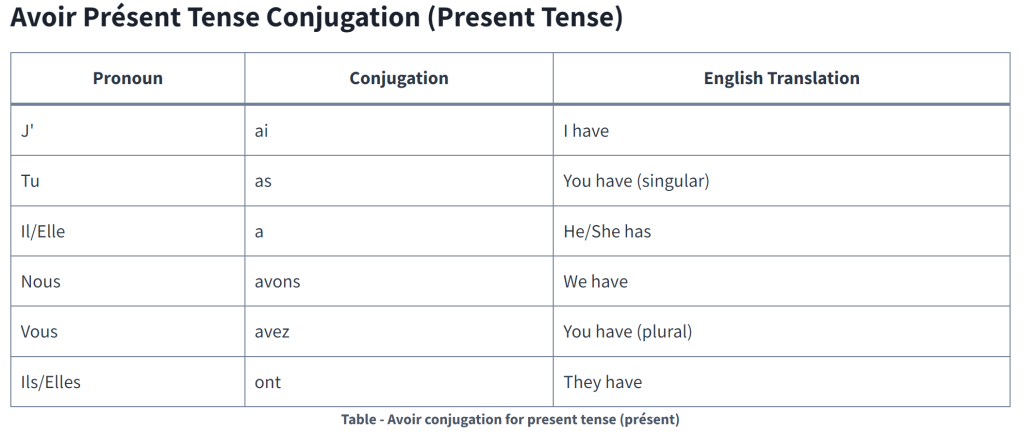
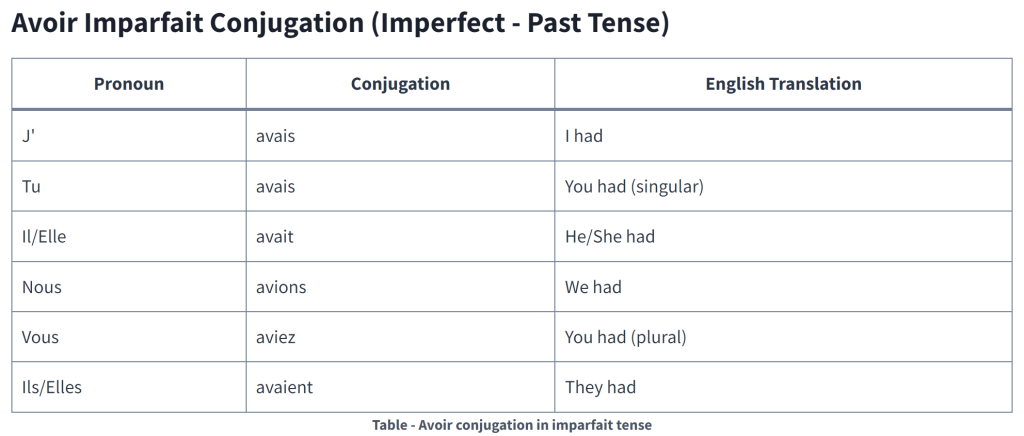
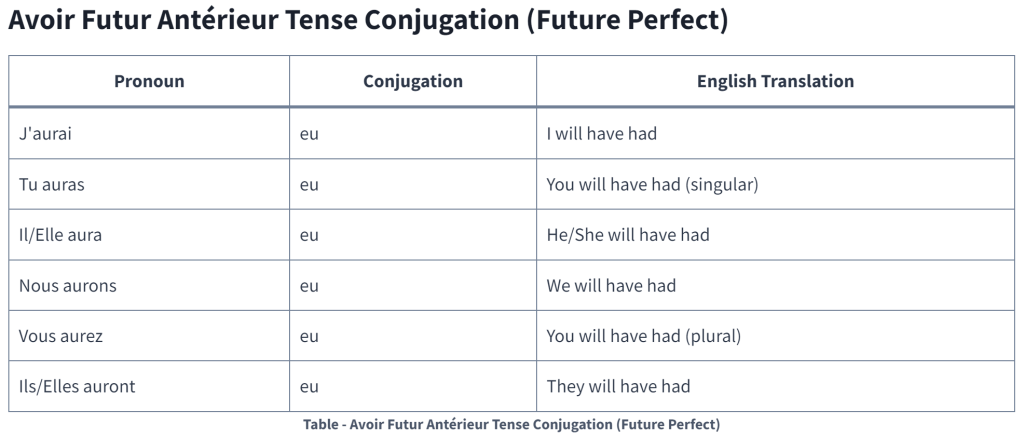
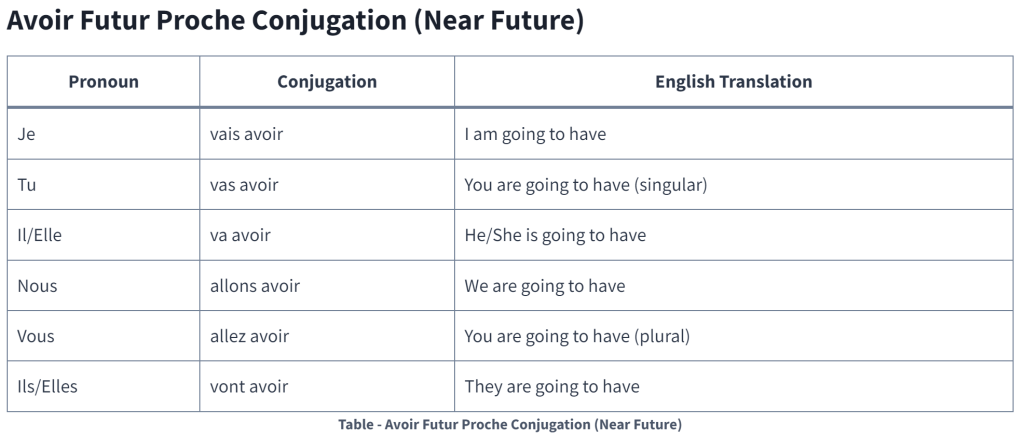
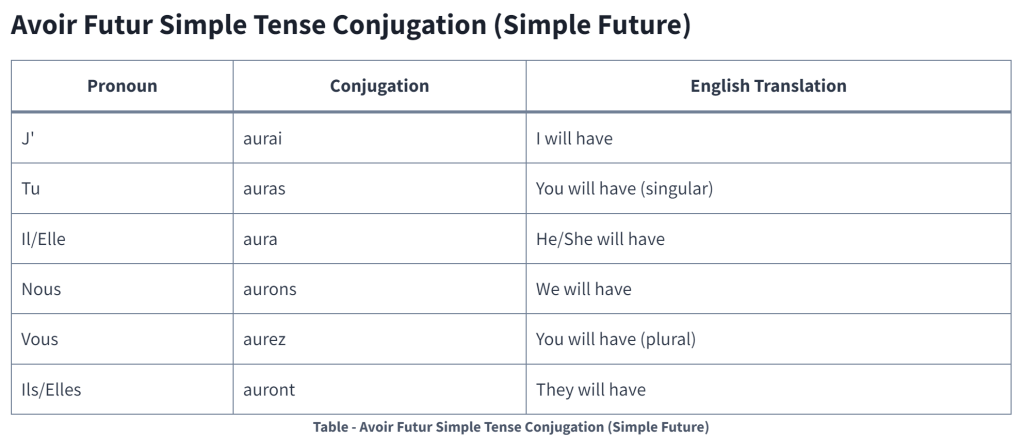
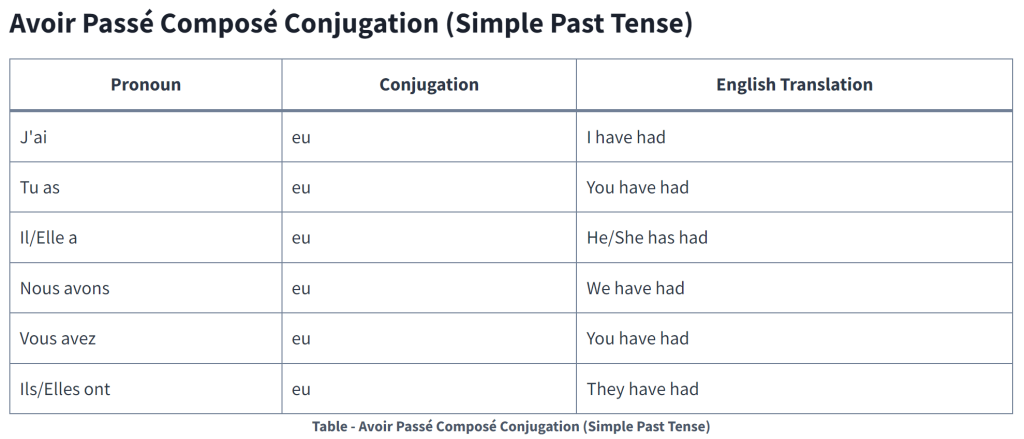
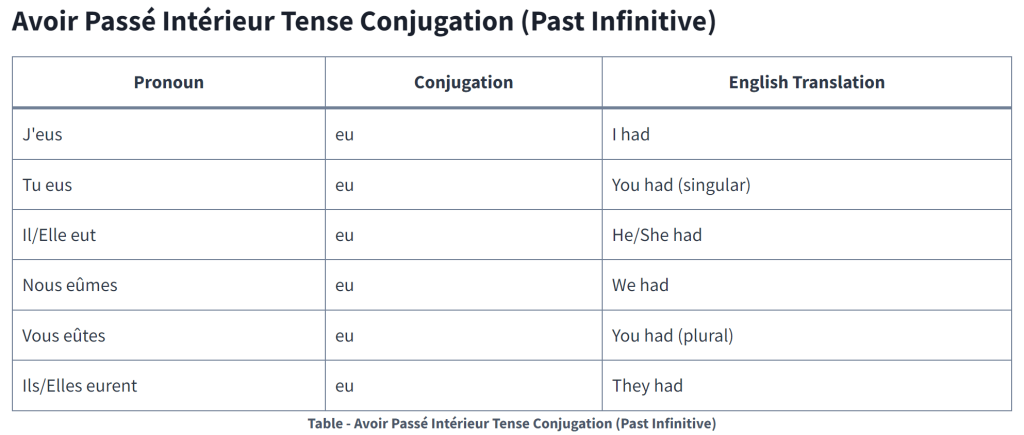
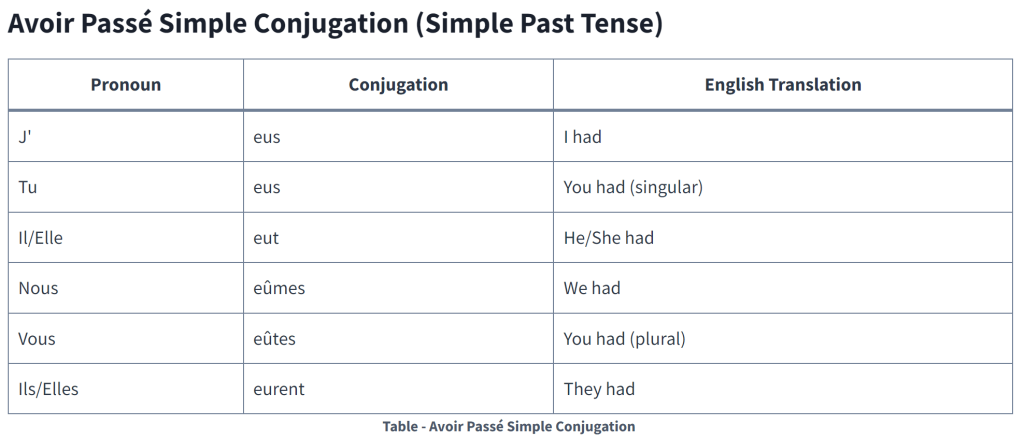
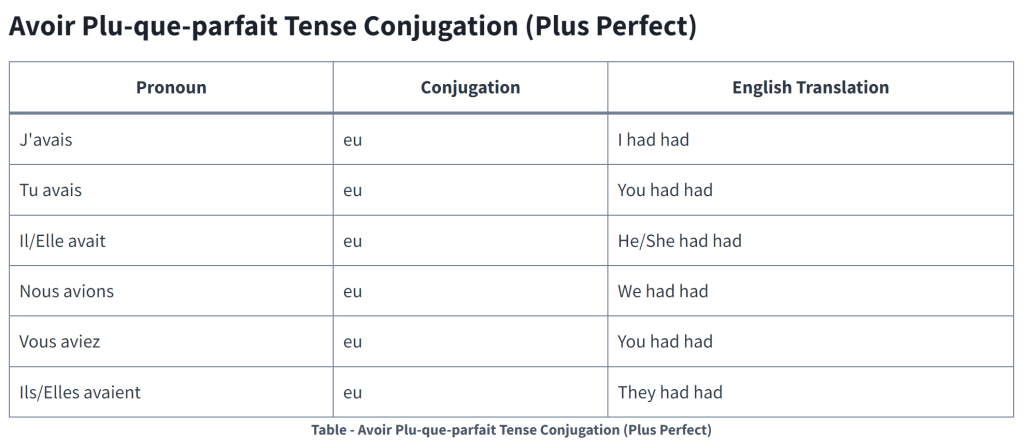
Other French Verb Conjugations You May be Interested In
We don’t only have être conjugations! Here are some others you may want to check out! Also, check out this link which tells you the history of the word.
